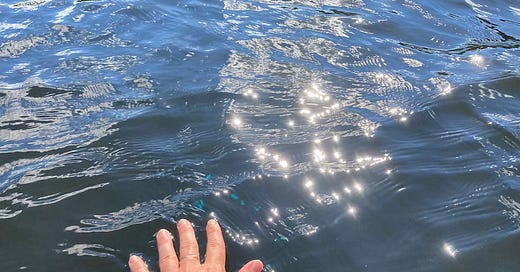New from Jules | 08.08.2022 | Always in Flux
My life looked totally different a year ago today. It has been over a year since I worked in a corporate job. It has been almost a year since I had a permanent residence. It has been four months since I left Oregon. It has been three months since I arrived at the Omega Institute for Holistic Studies in New York.
And yet, my life looks totally the same as a year ago today. I have shelter, I have food, I have clean water, I am healthy, I drive my car, I pay my bills, I have close friends near and far, I am loved and I love deeply, and I live life to the fullest.
The main difference is: My essential needs are met without any sense of permanence.
“Is not impermanence the very fragrance of our days?”
Rainer Maria Rilke wisely asked in 1923. Anita Barrows and Joanna Macy recently translated this poem within “In Praise of Mortality: Selections from Rainer Maria Rilke's Duino Elegies and Sonnets to Orpheus,” a mediation on the impact of the industrial revolution.
The answer is yes. Perhaps now even more so than ever.
Because the impact of the industrial revolution is systems optimized for efficiency, productivity, and growth, instilling a false sense of permanence—the state or quality of lasting or remaining unchanged indefinitely. This is not the natural, constantly adaptive way of life.
The morphing clouds, the shifting winds, the growing trees, the decaying topsoil, the sliding tectonic plates, the flowing magma. To our core, we are always in flux.
Permanence. As if we invented it ourselves, along with everything else we depend on for a sense of control, like time, money, and class.
Like most people, I’ve spent years paying off my debts to society. Student loans, business loans, car payments, credit card balances. But I was only looking at my bank balance. Not my life balance.
It has been a year since I have been 100% debt free. It took about 20 years to pay off my financial debt to institutions and about 10 years to pay off my emotional debt to others. Now I’m paying off my spiritual debt to the planet.
“Most Eastern philosophy warns that focusing on acquisition leads to attachment and vanity, which derail the search for happiness by obscuring one’s essential nature. As we grow older, we shouldn’t acquire more, but rather strip things away to find our true selves—and thus, peace,” said Arthur Brooks in The Atlantic Monthly article, “Your Work Peak is Earlier Than You Think,” which led to his book, From Strength to Strength: Finding Success, Happiness and Deep Purpose in the Second Half of Life.
This is how we can once again align to our purpose—Living in harmony with nature and our own true nature.
During my adventures connecting deeply with nature over the past few months here in New York and on my road trip east, I keep coming back to the mind-blowing idea that Richard Nelson Bolles humbly tucked into the epilogue of his classic job-hunting book, What Color is Your Parachute?
Here he described our three missions in life in great detail. He instructed readers to translate his Christian thought forms into their own. So, in my words, our three missions in life are:
Live in harmony with nature*,
Live in harmony with other humans,
Live in harmony with our own nature.
Most of us, myself included, easily spend most of our lives doing it backwards: prioritizing self first—what great thing is my soul meant to do here on earth?—then other humans, then nature. It just sounds backwards, doesn’t it?
And yet, I constantly find myself wondering how to put nature and other humans first—if I’m not first staying true to myself.
When I am true to my way of being in mind, body, spirit, and intuition, then my choices feel aligned with this vast, everchanging, and thus impermanent, ecosystem.
Which is how I found myself here.
Living at a retreat center in the woods.
And why I’m thinking a lot about where I’m at right now.
May you put nature first this week.
Love,
Jules
*For Bolles, #1 is actually God, but that’s synonymous with nature for me.



